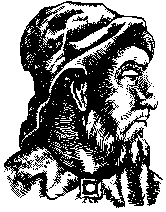“Do not ask things
to happen as you wish, but wish them to
happen as they do happen, and your life will go smoothly.”

Many great men lived in Ancient Greece and Rome, but, of them all, perhaps Epictetus was one of the wisest.
He was born into slavery, and it is said that while he was still young his owner punished him by stretching his leg on the rack. “If you stretch it any further you will break it,” said Epictetus quietly, and then added – “there, I told you!”
Later he was taken to Rome, at that time the capital of a vast empire, and became a slave of Epaphroditus, an important Roman in the service of Emperor Nero. This man sent Epictetus to study philosophy with a teacher called Musonius Rufus. In later years Epictetus spoke with affection and respect of this teacher, and it seems likely that he was an exceptional student.
That same year he managed to gain his liberty, and began to teach philosophy himself. When the new emperor, an ignorant and suspicious man, banished all the philosophers from Rome, Epictetus left, and went to live in Nicopolis, a city on the coast of Greece. Here he established a place where people could come to ask him questions and hear him speak. Those who wished to, became his pupils but, unlike other teachers of the time, Epictetus encouraged his students to become familiar with their own selves, rather than the philosophical texts.
Although he was lame and very poor, Epictetus always seemed free of the fears that afflict most men, and his fame spread far and wide; Emperor Hadrian went to visit him, and his successor, Emperor Antoninus Pius, attributed his remarkable twenty-year reign to the influence of Epictetus. Towards the end of his long life, Epictetus adopted a child who he found abandoned, and married a woman to help him take care of it.
His words were recorded for future generations by a pupil named Arrian, who made notes for his own use, whilst his master spoke. The following extract is from his book, “The Discourses”; a collection of Epictetus’ sayings and conversations.
“Our situation can be compared to what happens at a public festival. Cattle and oxen are brought there to be sold, and the greatest number of men come either to buy or sell; but there are a few who come only to look at the fair, and inquire how it is carried on, and why, and who set it up, and for what purpose; thus, in the fair of the world, some, like cattle, trouble themselves about nothing but fodder. For as to all you who busy yourselves about possessions and farms and slaves and public posts, these things are nothing else but mere fodder. Few are the men who attend the fair because they are fond of looking on and considering, ‘What, then, is the world? Who governs it? Has it no governor? Yet how is it possible, when neither a city nor a house can remain ever so short a time without some one to govern and take care of it, that this vast and beautiful structure should be regulated in such an orderly manner without plan and by mere chance? So there is someone who governs it. What sort of being is he? And how does he govern? And what are we who have been created by him, and what task were we created to fulfil? Have we some connection and relation with him; or none? Such are the thoughts aroused in these few; and thenceforth they have leisure for this alone, to investigate the festival of life before they depart.”
(The Discourses, Chap. 14)